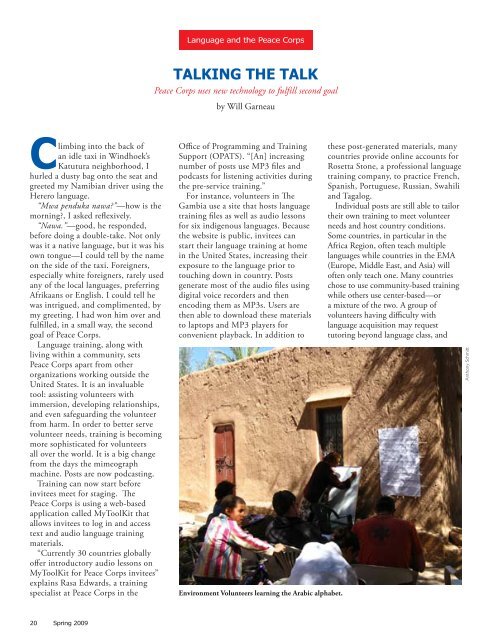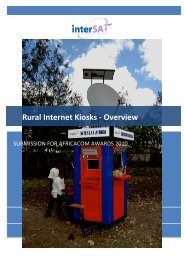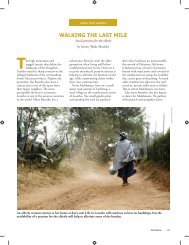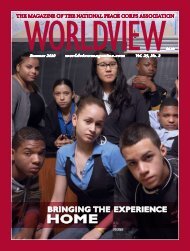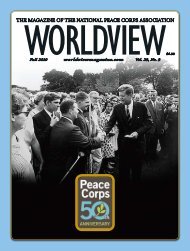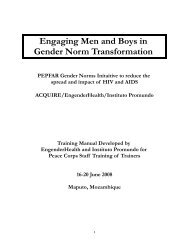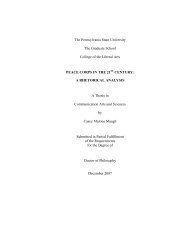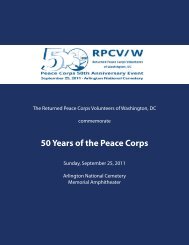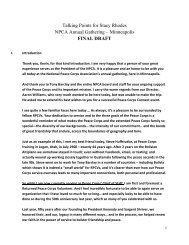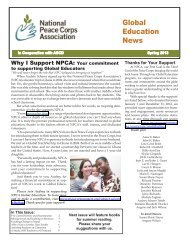special issue: inauguration 2009 - National Peace Corps Association
special issue: inauguration 2009 - National Peace Corps Association
special issue: inauguration 2009 - National Peace Corps Association
Create successful ePaper yourself
Turn your PDF publications into a flip-book with our unique Google optimized e-Paper software.
Language and the <strong>Peace</strong> <strong>Corps</strong><br />
TALKING THE TALK<br />
<strong>Peace</strong> <strong>Corps</strong> uses new technology to fulfill second goal<br />
by Will Garneau<br />
Climbing into the back of<br />
an idle taxi in Windhoek’s<br />
Katutura neighborhood, I<br />
hurled a dusty bag onto the seat and<br />
greeted my Namibian driver using the<br />
Herero language.<br />
“Mwa penduka nawa?”—how is the<br />
morning?, I asked reflexively.<br />
“Nawa.”—good, he responded,<br />
before doing a double-take. Not only<br />
was it a native language, but it was his<br />
own tongue—I could tell by the name<br />
on the side of the taxi. Foreigners,<br />
e<strong>special</strong>ly white foreigners, rarely used<br />
any of the local languages, preferring<br />
Afrikaans or English. I could tell he<br />
was intrigued, and complimented, by<br />
my greeting. I had won him over and<br />
fulfilled, in a small way, the second<br />
goal of <strong>Peace</strong> <strong>Corps</strong>.<br />
Language training, along with<br />
living within a community, sets<br />
<strong>Peace</strong> <strong>Corps</strong> apart from other<br />
organizations working outside the<br />
United States. It is an invaluable<br />
tool: assisting volunteers with<br />
immersion, developing relationships,<br />
and even safeguarding the volunteer<br />
from harm. In order to better serve<br />
volunteer needs, training is becoming<br />
more sophisticated for volunteers<br />
all over the world. It is a big change<br />
from the days the mimeograph<br />
machine. Posts are now podcasting.<br />
Training can now start before<br />
invitees meet for staging. The<br />
<strong>Peace</strong> <strong>Corps</strong> is using a web-based<br />
application called MyToolKit that<br />
allows invitees to log in and access<br />
text and audio language training<br />
materials.<br />
“Currently 30 countries globally<br />
offer introductory audio lessons on<br />
MyToolKit for <strong>Peace</strong> <strong>Corps</strong> invitees”<br />
explains Rasa Edwards, a training<br />
<strong>special</strong>ist at <strong>Peace</strong> <strong>Corps</strong> in the<br />
Office of Programming and Training<br />
Support (OPATS). “[An] increasing<br />
number of posts use MP3 files and<br />
podcasts for listening activities during<br />
the pre-service training.”<br />
For instance, volunteers in The<br />
Gambia use a site that hosts language<br />
training files as well as audio lessons<br />
for six indigenous languages. Because<br />
the website is public, invitees can<br />
start their language training at home<br />
in the United States, increasing their<br />
exposure to the language prior to<br />
touching down in country. Posts<br />
generate most of the audio files using<br />
digital voice recorders and then<br />
encoding them as MP3s. Users are<br />
then able to download these materials<br />
to laptops and MP3 players for<br />
convenient playback. In addition to<br />
Environment Volunteers learning the Arabic alphabet.<br />
these post-generated materials, many<br />
countries provide online accounts for<br />
Rosetta Stone, a professional language<br />
training company, to practice French,<br />
Spanish, Portuguese, Russian, Swahili<br />
and Tagalog.<br />
Individual posts are still able to tailor<br />
their own training to meet volunteer<br />
needs and host country conditions.<br />
Some countries, in particular in the<br />
Africa Region, often teach multiple<br />
languages while countries in the EMA<br />
(Europe, Middle East, and Asia) will<br />
often only teach one. Many countries<br />
chose to use community-based training<br />
while others use center-based—or<br />
a mixture of the two. A group of<br />
volunteers having difficulty with<br />
language acquisition may request<br />
tutoring beyond language class, and<br />
Anthony Schmitt<br />
20 Spring <strong>2009</strong>


